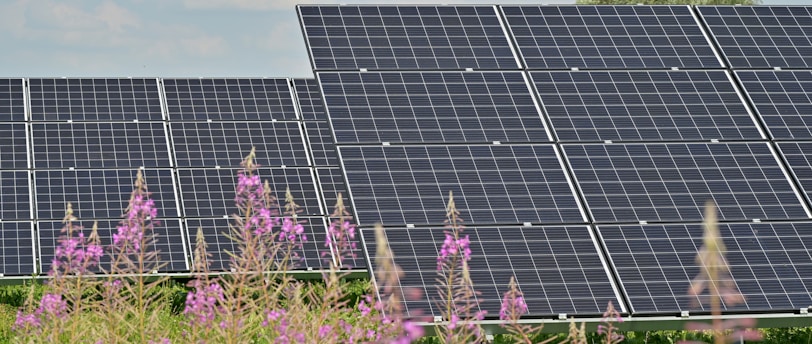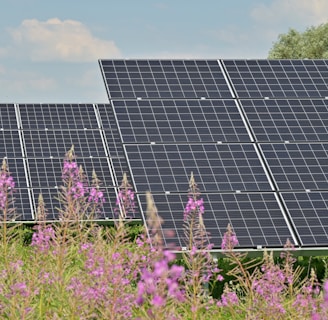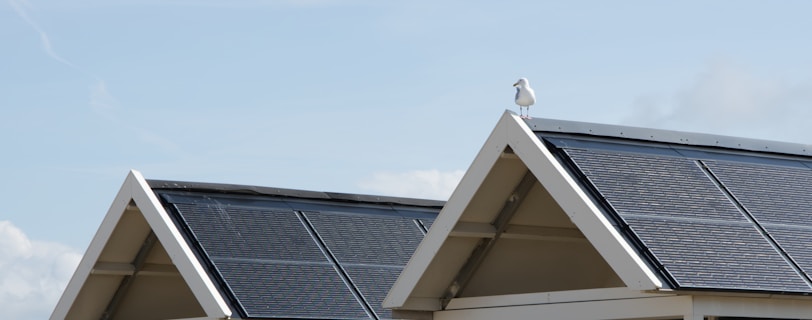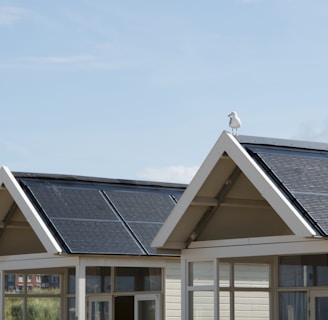Maximizing Efficiency in Solar Panels
Harnessing solar energy effectively is key to maximizing the benefits of solar panels. This comprehensive guide aims to equip homeowners with the knowledge to make informed decisions about their solar energy systems.
SOL GUIDE
7 min read


In the quest for sustainable living and energy independence, solar panels have emerged as a leading solution for homeowners. This guide dives into the nuances of selecting high-efficiency solar panels, optimizing their installation for maximum sun exposure, and maintaining them to ensure long-term efficiency.
"Optimal Solar System Efficiency Achieved Through Strategic Installation"
Maximizing Efficiency in Solar Panels: Tips for Every Homeowner
Solar panel efficiency can vary significantly with temperature changes. High temperatures can reduce the efficiency of photovoltaic cells, leading to lower energy output. Understanding the thermal coefficient of your solar panels can help you anticipate and mitigate efficiency losses during hot weather. Strategies such as installing panels in well-ventilated areas and using materials with lower heat absorption can make a substantial difference.
Solar system efficiency isn't just about the panels themselves but also about how they're integrated into your home's energy system. Factors such as shading, orientation towards the sun, and even the type of inverter used can significantly impact the system's efficiency. Implementing smart monitoring systems can also provide real-time data to optimize performance.
Solar energy conversion efficiency is a measure of how much sunlight can be converted into usable electricity. Modern solar panels typically have an efficiency rate of 15-22%, but advancements in technology are steadily improving these numbers. Understanding the efficiency of different solar panel types can guide you in choosing the most suitable option for your home.
We Recommend This Solar Setup Here for Quick Solar Efficient Power Generation.
Ensuring your solar panel system operates at peak efficiency involves more than just proper installation. It's about ongoing optimization and maintenance. Here’s a comprehensive checklist that homeowners can follow to maximize their solar energy output:
Perform Regular Panel Cleanings: Dust, pollen, leaves, and bird droppings can significantly reduce your solar panels' efficiency. Develop a cleaning schedule based on local conditions, aiming for at least a bi-annual cleaning or more frequently in dusty areas.
Monitor and Mitigate Shading: Trees grow and buildings rise. Regularly inspect your solar panels throughout the year to identify new shading issues. Early morning and late afternoon are critical times to check for shadows. Prune trees or adjust panel placement as necessary.
Check Inverter Efficiency: The inverter is the heart of your solar power system, converting DC electricity into AC. Monitor its efficiency and operational status through its built-in display or a connected app. Look out for any fault indicators or unexpected drops in efficiency and address them promptly.
Inspect Wiring and Connections: Loose or damaged wiring can lead to significant efficiency losses. Inspect your system's wiring annually to ensure all connections are tight and free of corrosion. Consider having a professional solar electrician perform this check to ensure safety and reliability.
Update System Software: Like any modern technology, solar inverters and monitoring systems receive software updates that can improve functionality and efficiency. Ensure your system's firmware is up-to-date to take advantage of these improvements.
Evaluate System Performance: Use your system's monitoring software to track performance over time. Compare your solar output against expected performance metrics to identify any discrepancies that could indicate an issue or inefficiency within your system.
Conduct an Energy Efficiency Audit: Regularly assess your home's energy use to identify opportunities for improvement. Energy-efficient lighting, appliances, and insulation can reduce your overall energy demand, allowing you to make the most of your solar investment.
Consider System Expansion or Upgrades: As your energy needs change or as new technologies become available, consider expanding your solar panel system or upgrading components. Additional panels, a more efficient inverter, or battery storage can enhance your system's output and resilience.
Professional Maintenance and Inspection: While many aspects of solar panel maintenance can be DIY, annual inspections by a certified professional can identify issues you might miss. These experts can perform detailed checks and maintenance tasks to ensure your system's longevity and efficiency.
Stay Informed on Solar Advancements: The solar industry is rapidly evolving. Keep abreast of the latest technologies and best practices for solar energy to continuously optimize your system's performance.
After optimizing your solar panel system using the comprehensive checklist, maintaining and further enhancing its efficiency over time requires a strategic approach. This next section delves into advanced strategies for sustained solar energy efficiency, focusing on critical aspects like "solar panel efficiency vs temperature," "solar system efficiency," "how efficient is solar energy," and "solar inverter efficiency." These strategies are designed to ensure your solar system continues to operate at peak efficiency, maximizing your investment in solar energy.
Adapting to Solar Panel Efficiency vs Temperature Dynamics:
Climate Adaptation Strategies: Implement adaptive strategies to counteract the efficiency losses due to temperature fluctuations. This includes using cooling technologies or selecting panels with a lower temperature coefficient.
Optimal Installation Techniques: Consider the installation angle and airflow around panels to naturally reduce temperature impacts, enhancing long-term efficiency.
Boosting Solar System Efficiency with Smart Technology:
Smart Monitoring Systems: Utilize advanced monitoring systems to track and analyze your solar system's performance in real-time. This technology can alert you to efficiency drops and help pinpoint areas for improvement.
Automated Adjustments: Invest in systems that automatically adjust panel angles and operation based on weather conditions and solar intensity, optimizing daily efficiency.
Evaluating Solar Energy Efficiency Through Data Analysis:
Performance Benchmarks: Regularly compare your system's output against expected benchmarks for your area and setup. Use this data to identify underperformance issues and rectify them promptly.
Longitudinal Data Analysis: Analyze your system's performance data over time to understand the impact of seasonal changes and aging on efficiency. This can inform maintenance schedules and potential upgrades.
Ensuring Solar Inverter Efficiency Over Time:
Inverter Health Checks: Conduct periodic health checks of your solar inverter, as it plays a crucial role in converting solar energy into usable electricity. Look for signs of wear and tear, and schedule professional inspections as needed.
Upgrade Pathways: Stay informed about advancements in inverter technology that can offer higher efficiency or better compatibility with existing solar panels. Upgrading your inverter can be a cost-effective way to boost overall system efficiency.
Implementing Efficiency-Enhancing Modifications and Upgrades:
Component Upgrades: Regularly review the market for new and more efficient solar panel models or auxiliary components. Upgrading parts of your system can yield significant efficiency improvements.
System Expansion: If your energy needs increase or if you wish to capitalize on improved technologies, consider expanding your solar system. Adding panels or integrating battery storage can enhance your system's capacity and efficiency.
Advanced Strategies for Sustained Solar Energy Efficiency
Optimization Checklist for Solar Panel Efficiency
How Efficient is Solar Energy? Exploring Solar Panels
Solar Panel Efficiency vs. Temperature: Understanding the Impact


Solar Generators on Amazon
Optimizing Solar Panel Performance: Navigating the Efficiency vs. Temperature Challenge
The relationship between solar panel efficiency and temperature is a critical aspect of solar energy management that often goes overlooked. Solar panels, by their nature, convert sunlight into electricity, but their efficiency can significantly decline as temperatures rise. This phenomenon occurs because solar cells generate more electrical resistance as they get warmer, leading to lower efficiency in energy conversion. Understanding this dynamic is essential for troubleshooting and optimizing solar panel performance, especially in regions experiencing high temperatures.
To effectively troubleshoot issues related to solar panel efficiency versus temperature, it's crucial to first monitor the temperature coefficients of your panels. Each panel has a specified temperature coefficient, indicating how much its efficiency will decrease with each degree Celsius increase in temperature. By comparing actual performance data against expected efficiency reductions due to temperature, homeowners can identify if their solar panels are underperforming even after accounting for natural heat-related efficiency losses. Implementing shade structures or cooling systems to minimize direct heat exposure, and ensuring adequate airflow around panels, can mitigate some of the negative effects of high temperatures.
Furthermore, optimizing panel orientation and installation can play a significant role in managing temperature effects. Panels installed with a slight gap between them and the roof can allow for better air circulation, reducing heat buildup. Additionally, employing reflective coatings or materials on surfaces adjacent to solar panels can help lower ambient temperatures, further enhancing panel efficiency. By taking proactive steps to address the temperature-related challenges, homeowners can ensure their solar systems operate optimally, maximizing energy output and extending the lifespan of their solar investment.


For our Artice on Solar Lighting for Landscapes
If Interested in Survival and Electric Setups
Maximizing Solar Inverter Efficiency: Technical Insights
Solar inverters are pivotal in the solar energy system, converting the direct current (DC) generated by solar panels into alternating current (AC) that can power homes and be fed back into the electricity grid. Their efficiency not only affects the amount of usable electricity generated but also impacts the overall reliability and performance of the solar installation. Technical efficiency in solar inverters is measured by their ability to minimize energy loss during this conversion process. High-efficiency models can achieve conversion rates upwards of 98%, indicating that only a small fraction of the solar energy is lost. Several factors contribute to inverter efficiency, including the quality of semiconductor materials used, the design of the electrical circuitry, and the inverter's ability to handle varying levels of solar irradiance effectively.
Advanced technical features such as Maximum Power Point Tracking (MPPT) are crucial for optimizing inverter efficiency. MPPT algorithms enable the inverter to adjust the electrical load and maximize the power output from solar panels under different conditions. This is particularly important in variable weather conditions, where the intensity of sunlight and the temperature can fluctuate significantly throughout the day. Inverters with multiple MPPT channels can manage arrays of solar panels independently, allowing for optimal performance even when parts of the array are shaded or oriented differently. Additionally, smart inverters incorporate monitoring and communication features that provide real-time data on system performance, enabling precise troubleshooting and efficiency improvements. As the solar energy industry continues to evolve, the development of more sophisticated inverter technologies will play a key role in maximizing the efficiency and effectiveness of solar power systems.


We Recommend The 5000W DC 48V Pure Sine Wave Solar Inverter
To support our work, we may earn a commission when you buy through links on our site. As an Amazon Associate, I earn from qualifying purchases.
Cookie Notice: Our website uses cookies to enhance your browsing experience. By continuing to use our site, you agree to our use of cookies. If you wish to manage your cookie preferences, you may do so in your browser settings.
To support our work, we may earn a commission when you buy through links on our site. As an Amazon Associate, I earn from qualifying purchases.This page may contain affiliate links, which means if you click through and make a purchase, we may receive a commission at no additional cost to you. This helps support our research and editorial team.




